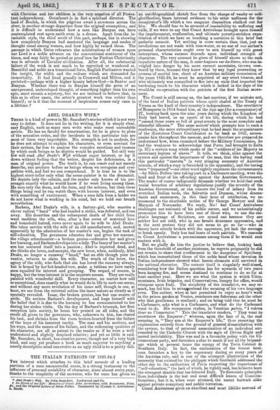ABEL DRAKE'S Wa h.* Marx is a kind of power
in Mr. Saunders's stories which it is not very easy to define. It does not lie in the writing, for it is simply clear, easy English, such as many men write who make most unreadable novels. He has no faculty for constructicm, for he is given to plots of the sensation order, and the incidents in this particular tale are most of them very improbable. His strength is not in analysis, for he does not attempt to explain his characters, or even account for their actions, far less to analyse the complex emotions and reasons by which such beings as he depicts would be guided. Yet still very few will read Abel Drake's Wife without eager interest, or lay it down without feeling that the writer, despite his deficiencies, is a man of original power. The truth is, he can create and not merely describe, can produce before us beings whom we recognize and sym- pathise with, and feel we can comprehend. It is true he is to the highest story-teller only what the scene-painter is to the dramatist. He depicts only the outside, and the reader only knows of his per- sonages exactly what he would know if he were living among them. He sees only the dress, and the form, and the actions, but then these things being real he can watch them with human interest, and even with something of excitement. When a man falls from a ladder we do not know what is working in his mind, bat we hold our breath nevertheless.
Barbara, Abel Drake's wife, is a factory- girl, who marries a clever radical "hand" who had headed a strike, was defeated, and ran away. His desertion and the subsequent death of her child from want maddens the wife, who, after a fine scene of maternal love and household hatred, vows 'neveragain to be wife to Abel Drake. She takes service with the wife of an old manufacturer, and, moved apparently by the admiration of her master's son, begins the task of self-education. The governess educates her and gives her manner, the village schoolmaster—a broken genius—educates her and gives her learning, and Barbara develops into a lady. The fancyof her master's son has matured itself into a passion ; Abel is reported dead, and she thinks she loves, and accepts, the new lover, when, suddenly, Abel Drake, no longer a runaway " hand," but an able though poor in- ventor, returns to claim his wife. The wrath of the lover, the agony of the wife, who finds that she has loved the runaway always, but is bound by her hot-headed vow, make a tableau we have rarely seen equalled for interest and grouping. The sequel, of course, is happy, but the true interest is in the separate scenes. They are really painted with wonderful skill. Every character, no matter how odd or exceptional, does exactly what he would do in life in each one scene, and without any more revelation of his inner self, though in one, at least, we see from the external action the inner nature as clearly as if specially revealed. Isaac, the broken genius, has but one source of pride. He notices Barbara's development, and hugs himself with the belief that it is due to the learning be has communicated to her during her stolen visits. On the day of Barbara's triumph, her first reception into society, he hears her praised on all sides, and the credit all given to the governess, who, unknown to him has shared Ins task, and shrinks from the room broken-hearted from ; the failure of the hope of his innocent vanity. The man and his motives, and his ways, and the causes of his failure, and the redeeming qualities of Ins character, are all as patent to the reader as if he were a well- understood and slightly despised relative; and yet so little is said. Mr. Saunders, in short, has creative power, though not of a very high kind, and may yet produce a book as muck superior to anything a merely descriptive mind can evolve as an ugly child is to a pretty doll.






























 Previous page
Previous page